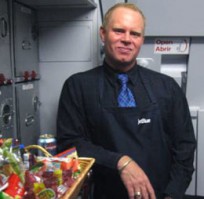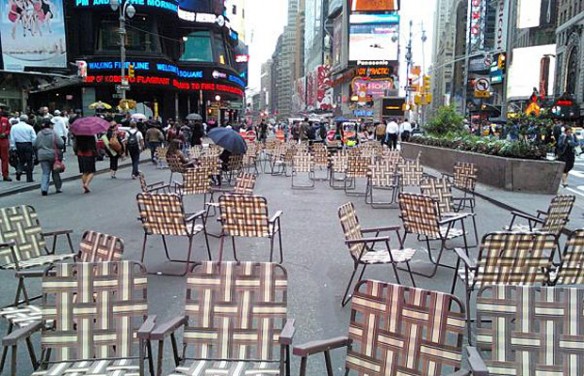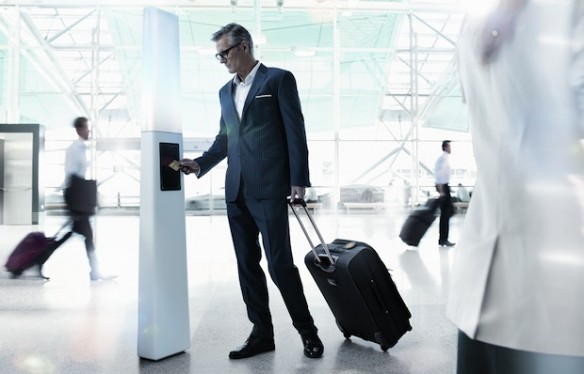














August 19, 2010 | permalink
Courtesy of popbitch:
* Holiday trips abroad:
1971 - 6.7 million
2008 - 69 million
2009 - 58.6 million (thanks, bankers)* In 1950s a two-week summer package holiday cost £35 per person - 1/5th of the average annual salary.
* In 2010 the average annual salary is just over 25k so a comparable package holiday would be 5k.
* Throughout the last decade Spain, France and the USA were the most popular countries for UK (Spain + France accounts for 38% of travel).
* In 2009 only Jamaica, Lithuania and Egypt reported a rise in British visitors.
* In 2009 27,272 Brit passports were lost or stolen abroad. Visitors to Spain, Thailand, Pakistan and Cyprus needed most Foreign Office help and 994 Brits were arrested abroad on drug offences.
August 10, 2010 | permalink
It’s hard to blame flight attendant Steven Slater for his meltdown aboard JetBlue Flight 1052 yesterday at JFK – after all, passengers have them all the time. If I understand the sequence of events correctly, a passenger unbuckled his seatbelt upon landing, stood up to retrieve his bag while taxiing (a no-no under FAA regulations), was reprimanded by Slater, hit Slater in the head with his bag from the overhead compartment, refused to apologize, and then called him a “motherfucker.” Slater promptly got on the PA, announced “To the passenger who just called me a motherfucker: Fuck you. I’ve been in this business 28 years and I’ve had it.” Then Slater opened the rear door, fired the emergency slide, grabbed a couple of roadies from the beverage cart, and exited stage aft.

Slater wasn’t sorry, and when he coincidently bumped into passenger Phil Catelinet on the AirTrain afterward, he told him so. He still didn’t seem sorry when police stormed his house hours later (they found him blowing off steam) or when he left court wearing a smirk. The incident touched off a small media frenzy, with viewers seeming to rally behind him. “Predicting JetBlue’s batshit flight attendant becomes a folk hero and guests on cable and talk shows,” Roger Ebert tweeted last night. “A Sully for 2010.”
But not all airline employees are so charismatic. In the last three days, both TechCrunch’s Michael Arrington and Infectious Greed’s Paul Kedrosky posted screeds about their recent flights from hell – on two different airlines. Arrington flew from New York to Seattle and back on Delta last week, losing his bag – along with the bags of all his fellow first class passengers—and enduring a sneering employee when he went to find it.
July 22, 2010 | permalink
Aerotropolis finally has a release date—March 8, 2011—and an Amazon page. Operators are standing by to take your pre-orders.
July 22, 2010 | permalink

(Originally published on FastCompany.com.)
“New York? The whole damn place has been turned into a suburb,” sneered David Harvey, startling a roomful of New Yorkers who prided themselves on the same things he derided: the makeover of the city’s parks; the new network of bike lanes; the pedestrian malls along Broadway. “The feel of the city is losing its urbanity and being made okay for suburbanites to enjoy Times Square,” he continued, going on to condemn New York’s gentrification not on aesthetic or nostalgic grounds, but for being at the root of the financial crisis.
Harvey is having a bit of a moment in America, as much as any neo-Marxist economic geographer can. Earlier this month, his lucid explanation of the “econopocalyspe” (accompanied by animated whiteboard doodles) was a modest hit on Boing Boing. Richard Florida borrowed his concept of the “spatial fix”—the idea that capitalism gets bigger and badder every time it’s wriggles out of a crisis—for his latest book, The Great Reset. And Harvey’s own book-length explanation of the crisis, The Enigma of Capital is set to be published on these shores in September.
On Tuesday night in Manhattan, Harvey made a rare American appearance to discuss “experimental geography” and the role cities and suburbia played in the crisis. Starting from the idea of a “geographic unconscious”—“the way we think of space and time as ‘natural’ when they’re really constructed,”—Harvey blamed suburbia for brainwashing Americans into being good capitalists.
But the connections between urbanism and capitalism go deeper than that. In an essay published in New Left Review, he drew connections between Haussmann’s Paris, postwar America, gentrification and China’s instant cities. In each case, the construction efforts employed huge quantities of labor and required new forms of capital and credit, whether FHA mortgages or CDOs. In his estimation, China’s breakneck urbanization and the appetite for raw materials this creates is the only thing propping global capitalism up.
July 22, 2010 | permalink

• Marc Newson redesigns the airport check-in process to be painless. “Later this year, regular travelers will be able to get hold of a Q Bag Tag, an RFID-embedded luggage tag with permanent tracking number assigned to the owner, which stores information for each trip as well as forwarding instructions for lost baggage. A smart chip inside the new Q Card electronically waves frequent fliers through initial check-in to the Jetsonesque “Bag Drop injector.”“
• The first plane to fly on algae-based biofuel takes a spin at the Farnborough Air Show. “According to EADS (the maker of the Airbus), the higher energy content of the biofuel allows their Diamond Aircraft DA42 New Generation to use almost a half gallon less fuel per hour than it would on conventional, kerosene-based jet fuel. And the small aircraft does so without extensive engine modifications or sacrificing performance. Compared to Jet-A1 fuel, the exhaust from the algae fuel has 8 times less hydrocarbons as well as reduced nitrogen oxide and sulfur oxide emissions.”
• Suburbia was created as a safeguard against nuclear annihilation. “This is an unrecognized if not forgotten history of the roots of sprawl in the U.S. as a defensive measure. The outcome of the defense was similar to that of the attack it was meant to survive - a cratering of the cities.”
July 18, 2010 | permalink
“30 Seconds with Jacques Rogge,” president of the International Olympic Committee:
Q. The world knows you for your presence at the Olympics. What do you do the rest of the time?
A. I would start working at close to 8 o’clock. My normal day would be being briefed about the world media, and I get the highlights of the day. Then I would have individual visits by many people visiting Lausanne. When this is done, it is about 7, 8 p.m., and I go home. The other part is traveling, because you need to have face time. There is no way you can run such an organization with just e-mails, videoconferencing or telephone calls.
Q. Do you keep track of how far you fly each year?
A. I don’t keep track. My secretary – because I asked her one day, how many planes do I take a year? – she said about 150 or 170. I know exactly how the interior of the cabin of every single manufactured plane is, and likewise when I wake up in a hotel, I know immediately whether it is a Hilton or a Marriott.
July 18, 2010 | permalink
When the thermometer hits 125 degrees in Dubai, Dubai moves to London:
For the mega-wealthy oil billionaire families of the Gulf states, summertime means central London. When temperatures at home hit 50 degrees, they flock to the capital for the cool weather, the thriving social scene and the shopping – especially at Harrods which is, rather neatly, now owned by the Qatari royal family’s investment arm.
Some keep summer houses in London – there are said to be more than 100 billionaire Saudi families with second homes in the Knightsbridge area alone – while others prefer out-of-town locations such as Bishops Avenue, Coombe Hill in Kingston and St George’s Hill in Weybridge.
They’ll go to the Derby, Royal Ascot and the Berkshire Festival of Falconry, which is sponsored by the Abu Dhabi-based Emirates Falconers’ Club and attended by His Highness Sheikh Sultan Bin Tahnoon Al Nahyan.
Otherwise, whole floors of hotels around Hyde Park – the Jumeirah Carlton Tower now owned by the famous Dubai group and the Four Seasons Hotel, owned by Prince Alwaleed Bin Talal Al-Saud (who also owns the Savoy Hotel) – are block-booked.
During the days, the women have their drivers drop them in Hyde Park where they promenade around the Serpentine, stopping to soak up the coolness and cloudy skies on the benches or laying out on the grass in large circles with their friends. And then there’s shopping.
“Knightsbridge is London’s pop-up oasis,” London Evening Standard, July 14, 2010.
July 12, 2010 | permalink
...and if you’ve flown to Brazil lately, you’ll understand why they’re already freaking out:
It’s official. Brazil’s top three priorities ahead of the 2014 World Cup are airports, airports and airports. The head of Brazil’s organising committee told reporters in South Africa on Thursday that his country had to get a move on and upgrade its transport infrastructure in time for the 2014 competition.
“The three main priorities we have are airports, airports, airports,” said Ricardo Teixeira, the president of the Brazilian Football Confederation. Brazil plans to play games in 12 stadiums in 2014, more than in past tournaments because so many Brazilian cities were desperate to get involved in the prestigious competition.
But most of the host cities have airports that are too old and too small to cope with the estimated 600,000 fans who will fly to football’s spiritual home to take part in the month-long jamboree. Airports are more important for the 2014 competition than previous tournaments because distances between the host cities are massive and the country’s motorways are often atrocious.
July 09, 2010 | permalink
Old Dubai” evokes the bustling area around the Creek, where the Gulf emirate’s commercial tradition began, with dhows plying their trade with eastern ports and merchants haggling in the souks.
But in the wake of a global financial crisis that hit the city-state hard, old Dubai has come to represent something deeper – a longing for a return to roots, to the basic businesses that transformed it from sleepy fishing village to flourishing port town.
Strategically located between Africa, the Middle East and Asia, Dubai has long thrived as a trade hub. Many residents now hark back to the Dubai they knew before the city became obsessed with real estate. The frenzied development of apartment blocks, malls and business parks dazzled the world – before the property market collapsed and, along with the impact of the global turbulence, left the emirate with more than $110bn (€87bn; £72bn) of debt.
Al Maktoum International Airport appears a neat case study of all this. It opened last week with a solitary runway and cargo terminal. Windswept desert stretches around the 140 sq km complex, dotted with camels and industrial estates. Rather like the seaport developments in the 1970s, the airport seems impossibly ambitious: within 20 years it plans to add four runways and four terminals to serve more passengers than London and Atlanta combined.
Sceptics only have to look across the desert littoral of Dubai, where clusters of half-constructed tower blocks stand as embarrassing monuments to the misguided belief that property booms can last forever. Yet the airport is a prime example of Dubai reverting to the sounder economic foundations of trade, aviation, tourism and logistics – its economic drivers before the doomed love affair with property began in 2003.
July 08, 2010 | permalink
(Thanks to Wendy Perrin at Condé Nast Traveler for posing my question to Sir Richard.)

» Folllow me on Twitter.
» Email me.
» See upcoming events.

Greg Lindsay is a generalist, urbanist, futurist, and speaker. He is a non-resident senior fellow of the Arizona State University Threatcasting Lab, a non-resident senior fellow of MIT’s Future Urban Collectives Lab, and a non-resident senior fellow of the Atlantic Council’s Scowcroft Strategy Initiative. He was the founding chief communications officer of Climate Alpha and remains a senior advisor. Previously, he was an urban tech fellow at Cornell Tech’s Jacobs Institute, where he explored the implications of AI and augmented reality at urban scale.

----- | January 22, 2024
The Future of Generative AI in Architecture, Engineering, and Construction
----- | January 1, 2024
----- | August 3, 2023
CityLab | June 12, 2023
Augmented Reality Is Coming for Cities
CityLab | April 25, 2023
The Line Is Blurring Between Remote Workers and Tourists
CityLab | December 7, 2021
The Dark Side of 15-Minute Grocery Delivery
Fast Company | June 2021
Why the Great Lakes need to be the center of our climate strategy
Fast Company | March 2020
How to design a smart city that’s built on empowerment–not corporate surveillance
URBAN-X | December 2019
CityLab | December 10, 2018
The State of Play: Connected Mobility in San Francisco, Boston, and Detroit
Harvard Business Review | September 24, 2018
Why Companies Are Creating Their Own Coworking Spaces
CityLab | July 2018
The State of Play: Connected Mobility + U.S. Cities
Medium | May 1, 2017
Fast Company | January 19, 2017
The Collaboration Software That’s Rejuvenating The Young Global Leaders Of Davos
The Guardian | January 13, 2017
What If Uber Kills Public Transport Instead of Cars
Backchannel | January 4, 2017
The Office of the Future Is… an Office
New Cities Foundation | October 2016
Now Arriving: A Connected Mobility Roadmap for Public Transport
Inc. | October 2016
Why Every Business Should Start in a Co-Working Space
Popular Mechanics | May 11, 2016
Can the World’s Worst Traffic Problem Be Solved?
The New Republic | January/February 2016

January 31, 2024
Unfrozen: Domo Arigatou, “Mike 2.0”
January 22, 2024
The Future of Generative AI in Architecture, Engineering, and Construction
January 18, 2024
The Promise and Perils of the Augmented City
January 13, 2024